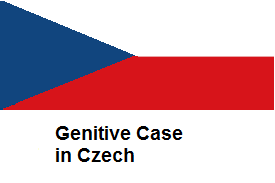Language/Czech/Grammar/Genitive-Case-in-Czech
Welcome to this Czech Grammar Lesson! Today, we'll review the genitive case in Czech.
The Czech language is a Slavic language with six cases. The genitive case is one of these cases, used to express possession, negation, and some prepositions. In this lesson, we will explore the genitive case in Czech, its formation, and usage in sentences.
The genitive case is used in Czech to indicate possession or to show a relationship between two nouns. In English, it's often indicated by the word "of."
Here's how to form the genitive case in Czech:
Masculine nouns ending in consonants
- Add "u" to the end of the noun
- Stůl (table) - stolu (of the table)
- Muž (man) - muže (of the man)
- Hrad (castle) - hradu (of the castle)
Feminine nouns ending in "-a"
- Replace the "-a" with "-y" and add "e" to the end
- Kniha (book) - knihy (of the book)
- Stavba (building) - stavby (of the building)
- Kavárna (cafe) - kavárny (of the cafe)
Feminine nouns ending in "-e"
- Add "e" to the end of the noun
- Kancelář (office) - kanceláře (of the office)
- Židle (chair) - židle (of the chair)
- Řeka (river) - řeky (of the river)
Neuter nouns ending in "-o"
- Replace the "-o" with "-a"
- Město (city) - města (of the city)
- Okno (window) - okna (of the window)
- Auto (car) - auta (of the car)
Neuter nouns ending in "-e"
- Add "e" to the end of the noun
- Kuře (chicken) - kuře (of the chicken)
- Kolo (bike) - kola (of the bike)
- Kuře (chicken) - kuře (of the chicken)
Plural nouns ending in "-i" or "-e"
- Add "ů" to the end of the noun
- Stoly (tables) - stolů (of the tables)
- Okna (windows) - oken (of the windows)
- Kanceláře (offices) - kanceláří (of the offices)
It's important to note that the genitive case can change depending on the gender and number of the noun. For example, "of the table" is "stolu" for a singular masculine noun, but "stolů" for plural masculine nouns. Additionally, some nouns may have irregular genitive forms that you'll need to memorize.
Using the genitive case correctly is important in Czech, as it helps to clarify the relationships between nouns in a sentence. With practice, you'll become more comfortable using the genitive case and communicating effectively in Czech.
Usage of the Genitive Case
Possession:
The genitive case is used to show possession, similar to the English possessive case. For example:
Mám kočku. (I have a cat.) -> Mám kočku mého bratra. (I have my brother's cat.)
Negation:
The genitive case is used to express negation with the words "bez" (without) and "žádný" (none). For example:
Bez auta nemohu jet. (I can't go without a car.)
Nemám žádné peníze. (I don't have any money.)
Prepositions:
Some prepositions in Czech require the use of the genitive case. Some examples are "od" (from), "kromě" (except), and "díky" (thanks to). For example:
Od mého domu je daleko do školy. (It's far from my house to school.)
Kromě svého bratra mám ještě sestru. (Except for my brother, I also have a sister.)
Díky tvé pomoci jsem dokončil práci. (Thanks to your help, I finished the job.)
Exceptions to the Genitive Case:
There are some irregular nouns that do not follow the above rules. Some examples are:
"Muž" (man) -> "Muže" (of the man)
"Dítě" (child) -> "Dítěte" (of the child)
"Vzduch" (air) -> "Vzduchu" (of the air)
Summary
The Genitive Case in Czech Grammar is used to indicate possession, origin, and other relationships between nouns. Here's a summary table to help you understand the main rules and endings for this case:
| Gender | Singular | Plural | Example | Genitive Form |
|---|---|---|---|---|
| Masculine Animate | -a / -u | -ů | muž (man) | muže (of the man) |
| Masculine Inanimate | -u / -a | -ů | stůl (table) | stolu (of the table) |
| Feminine | -y / -i | -í | žena (woman) | ženy (of the woman) |
| Neuter | -a | -í | město (city) | města (of the city) |
Keep in mind that this is just an overview, and there are exceptions and irregularities in the Czech language. Make sure to learn these rules in context, practice with native speakers, and use resources like textbooks and websites for a more in-depth understanding.
Examples of Use
Masculine
| ENTRANCE | VCHOD |
| CASTLE | HRAD |
| SINGULAR | PLURAL |
|---|---|
| VCHOD HRADU | VCHODY HRADŮ |
| THE ENTRANCE OF THE CASTLE | THE ENTRANCES OF THE CASTLES |
Feminine
| WINDOW | OKHO |
| SCHOOL | ŠKOLA |
| SINGULAR | PLURAL |
|---|---|
| OKNO ŠKOLY | OKNA ŠKOL |
| THE WINDOW OF THE SCHOOL | THE WINDOWS OF THE SCHOOLS |
Neuter
| KEY | KLÍČ |
| CAR | AUTO |
| SINGULAR | PLURAL |
|---|---|
| KLÍČ AUTA | KLÍČE AUT |
| THE KEY OF THE CAR | THE KEYS OF THE CARS |
Other Lessons
- Accusative Case in Czech
- Indefinite articles in Czech
- Negation
- Verb There to be in Czech
- Inclusive Case in Czech
- Questions
- Verb to speak in Czech
- Nouns
- Present Continuous in Czech
- How to Use "Být" (to Be)

